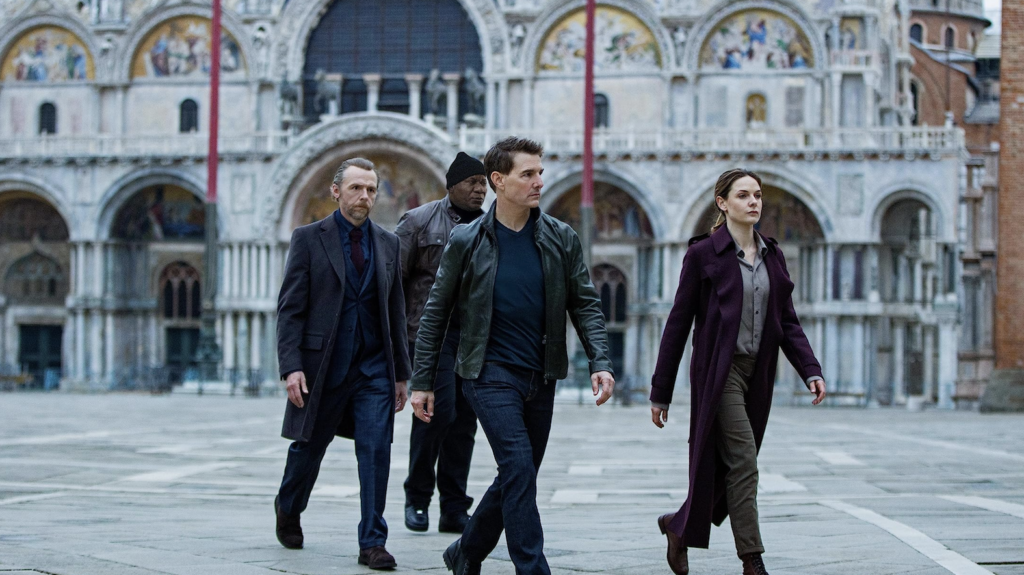“Your mission, should you choose to accept it.”
These are words that separate the “Mission: Impossible” series from every other spy franchise. It’s not the masks, it’s not the theme song, it’s not even the thrilling complicity of watching Tom Cruise risk his life for our entertainment. It’s that every installment begins not with an assignment, but a moral decision.
When James Bond is called into action, he’s yanked from whatever casino he’s wasting taxpayer dollars at and shuffled into M’s office, where he harasses the secretary before getting his mission. That’s the distinction; James Bond is forced to save the world while “Mission: Impossible’s” Ethan Hunt desires it.
Cruise, star of the recently released blockbuster and grammatical rollercoaster “Mission: Impossible — Dead Reckoning Part One,” does not immediately jump to mind as a “moral actor” in either sense of the term. But while best known for his more galactic approach to spirituality, Cruise is a baptized Catholic and attended the seminary for a year. He thus joins the exclusive club of former seminarians such as Joseph Stalin and Levar Burton.
One ponders just how swiftly he’d have ascended the hierarchy had he stayed the course, as Cruise’s charisma could make even St. Pope John Paul II look like a damp dishrag. Two of Tom’s ex-wives have also returned to Catholicism following their divorces. One soul lost to two gained is still a net profit in the ledger, right?
But if Cruise’s Scientology dominates his personal life, those Catholic roots seem to be harder to uproot in the “Mission: Impossible” films.
The franchise is littered with Christian references. In the first film, Hunt finds the answer to the mystery in a Gideon Bible (albeit on the inside flap rather than in the Gospels). In the third film, he infiltrates the Vatican in priestly garb, giving us a brief visual snippet of that road untraveled.
But starting with “Ghost Protocol,” the fourth in the series, the Hunt character begins to evolve. Having romantic entanglements in the previous three films, he is now conspicuously single. Whenever he crosses paths with a bodacious babe — not an infrequent occurrence in the world of espionage — he’s rather chaste in their interactions. Rogue MI6 agent Ilsa Faust spends three movies batting her eyelashes just to earn a side hug.

The little we see of Hunt in his free time has him living in a safehouse where a military cot is its least spartan feature. He reminds us of a monastic type, with saving the world as his charism. It is reflected in his ethos. In “Mission: Impossible — Fallout,” Ethan refuses to sacrifice his friend’s life to secure enriched uranium, risking nuclear war. His superiors chastise him for missing the bigger picture, for what man leaves a hundred sheep alone to save but one?
“Dead Reckoning” takes the leap from subtext to text, becoming explicitly theological in its aims. The main villain is a rogue AI called the Entity, which after easily hacking into the world’s financial and military institutions turns its attention to protecting its own existence. It identifies only two possible threats: a cruciform key with its original source code embedded inside, and agent Hunt. Both governments and criminals are frightened of the Entity, seeking the key to control or serve it. The Entity singles out Ethan because he’s the only one who wants to destroy it, or perhaps the only one who thinks it possible.
The Entity has human help in the form of Gabriel, a shadowy figure from Hunt’s past. In the opening flashback we see Gabriel shoot a woman named Maria, who then dies in Hunt’s arms. It’s the Antichrist’s take on the Annunciation, where instead of God’s emissary sharing the good news with Mary, he brings death instead. This Gabriel is sincere in his faith to this anti-god, but it’s service at the expense of others, reigning in hell rather than serving in heaven.
“I will kill you and your god,” Hunt snarls at one point, sounding like St. Boniface approaching the pagan tree with an ax in hand. This is more than merely saving the world; it’s a holy war.
The cruciform key is seized by a thief named Grace (Haley Atwell), which means our hero and his team need grace if they are to find the cross (there is no Oscar for subtlety). Grace needs grace of her own, seeking a way to leave her own sinful past behind her. She wishes to simply have her criminal record erased, but Hunt refuses. Forgiveness without repentance is just putting a bandage on gangrene. He instead makes a more interesting offer: join the team.
The IMF (Impossible Missions Force) is apparently full of former criminals given the chance to earn their penance one mission at a time. This isn’t a penal battalion by any means, all are there willingly. After all, it’s only your mission if you choose to accept. One team member who strayed and came back, the same man Hunt risked the world for, puts it concisely: “freedom isn’t always free.” Theirs is a community brought together by a common mission, helping one another achieve salvation through good works and faith in their higher calling. Sounds almost familiar.
Grace, of course, runs away from this opportunity every chance she can, but then who among us hasn’t? In another thwarted pitch, Hunt promises hard work and low pay. But he makes one final offer: “I will always value your life over mine.”
“You don’t even know me,” counters Grace.
“Why should that matter?”
Tom Cruise could have been pope in another life, but here he becomes Jesus. Blasphemous? Perhaps, but I think Christ himself couldn’t help but admire a man riding a motorcycle off a cliff.

